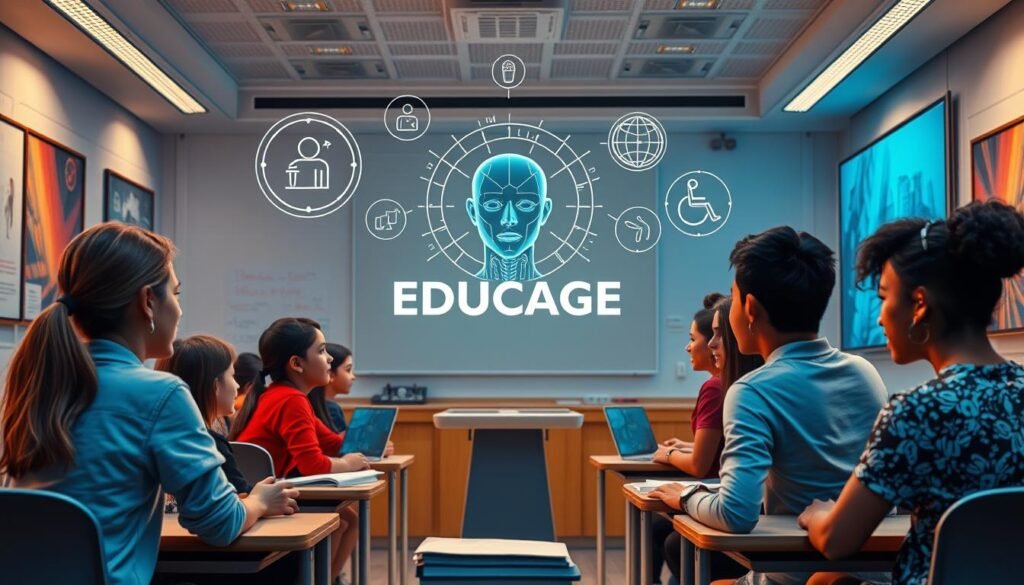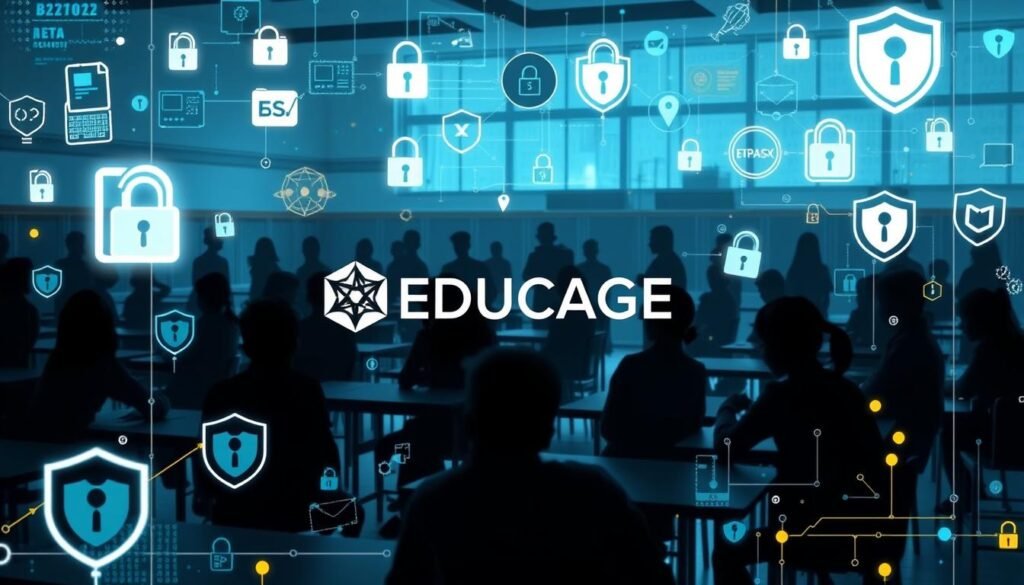Technology is changing how we learn, and it’s crucial to think about its impact. Aristotle said, “What we learn with pleasure, we never forget.” This shows how important education is, but also how we must use it wisely. AI in education brings many benefits, but it also raises important ethical questions.
AI ethics in education is a big deal today. It affects everyone in schools, from teachers to students. As schools use more data to make decisions, they face new challenges. For example, 62% of college leaders struggle to find staff who know about data, but 97% want to use data wisely1. Schools are moving towards using data more, which means they need clear rules for using AI1.
It’s important to think about how AI affects fairness and bias in learning. This helps create a fair and welcoming place for everyone.
This article will look at the ethics of using technology in schools. We’ll talk about how to avoid bias, be open about data, and keep student information safe. This way, technology can help us learn and grow without losing the core values of education.
Key Takeaways
- Ethical considerations are paramount as AI is integrated into educational systems.
- AI tools must prioritize fairness and accessibility to enhance learner equity.
- Transparency in data usage is essential to build trust within the educational community.
- Data-driven decisions are becoming increasingly prevalent in higher education.
- Professional development for educators is necessary to effectively leverage AI technologies.
Understanding Artificial Intelligence in Education
Artificial intelligence in education is now a key part of educational technology. It was first explored about 50 years ago. Back then, AI was still in its early stages, with only a few examples like Carbonell’s 1970 paper on SCHOLAR AI. This system was designed to teach geography using semantic networks2.
Now, AI offers personalized learning experiences. It uses machine learning to understand students better. This helps teachers tailor lessons and keep students engaged. For example, AI can now detect how students feel and what motivates them2.
Using AI in schools requires careful ethics. It’s important to teach both teachers and students about AI. They need to know how it works and how to use it responsibly. This includes understanding AI’s role in classrooms and creating rules for its use in educational settings3.
When diving into AI in education, remember its many aspects. This includes how AI behaves and what counts as cheating with AI. Tackling these issues helps us use AI to improve learning3.
| AI Era | Key Developments | Current Focus |
|---|---|---|
| 1970s | SCHOLAR AI tutor system | Tutoring skills and personalized learning |
| 2000s | Introduction of emotional assessment tools | Individual learner engagement |
| Today | Integration of machine learning techniques | Ethical AI use and institutional policies |
The Role of AI in Modern Educational Technology
Artificial Intelligence (AI) is changing education fast, especially in K-12. It offers many ways to make learning personal for everyone. Using AI tools can really improve how we teach and learn.
Applications of AI in K-12 Education
AI brings new tools to help teachers teach better. Learning systems use AI to create paths that fit each student’s needs. This means students get help that really works for them.
AI also helps with grading, saving teachers time. This lets them focus more on helping students. It makes school work easier and gives feedback right away.
Benefits of AI Systems for Educators and Students
AI brings big benefits to schools. Teachers work smarter, spending more time with students. This makes learning fun and engaging for everyone.
AI is especially helpful for students with special needs. It makes learning fit their unique needs. Teachers say AI helps them adjust lessons based on what students need right then.
But, using AI well is key. It should make teaching better, not replace it. Teachers and students both need to feel valued in the classroom45.

AI Ethics in Education
Artificial intelligence is changing education, making it crucial to focus on AI ethics. Ethics in AI education is key because it affects both students and teachers deeply. A new Ethical Framework for AI in Education aims to help learners while keeping them safe6.
This framework shows the need for education to use AI wisely. It helps solve big problems and makes learning better for everyone6.
Importance of Addressing Ethics in AI Usage
Using AI in classrooms comes with risks. These include bias, privacy concerns, and too much reliance on AI6. Teachers must understand these risks, especially with new tools like personalized learning systems7.
Tools like Revision Assistant help teachers give feedback quickly. But, they raise questions about fairness and equality7.
Ethical Implications of AI on Learner Equity
AI affects learner equity in big ways. It can make learning better by tailoring it to each student’s needs7. This can help close the gap in education when used right.
But, teachers must teach about digital citizenship and AI use responsibly7. Governments and groups must work together to teach AI literacy. This will help both teachers and students deal with AI’s ethical challenges6.
Challenges of Implementing AI in Educational Settings
Bringing AI into schools comes with big challenges. These include being ready with technology, training teachers, and dealing with change. Schools need to tackle these ethical challenges in AI education to make the transition easier. For example, if leaders don’t train teachers well, they might not know how to use AI tools.
A study shows that having solid plans is key. These plans should address these barriers and ensure AI is used fairly. Building trust among teachers and students is essential.
The ed-tech market is expected to hit $404 billion by 2025, thanks to AI8. But, as AI gets better, so do the problems with keeping student data safe. Schools struggle to protect this data when using AI8.
Also, some AI tools show biases that can harm learning. For example, an AI system was less likely to help Black patients than white ones, even with the same health issues9. This could mean AI tools might not treat all students fairly, affecting their grades.

For AI to work well in schools, everyone needs to work together. We must keep improving AI and think about ethics. With good communication and plans, we can get past these hurdles and start a new chapter in teaching.
Algorithm Bias and Fairness in AI Tools
Algorithm bias is a big worry in using AI in schools. AI tools are making more decisions in education, and we need to make sure they’re fair. It’s important to understand how biases affect students so we can make AI better for everyone.
Understanding Algorithmic Bias
Algorithmic bias happens when AI systems unfairly treat certain groups. This often comes from biases in the data they’re trained on. For example, facial recognition systems work worse for darker skin tones, showing racial biases10.
This makes people distrust AI, especially in schools. To fix this, we need to find and fix biases in AI systems.
Impact of Bias on Underrepresented Student Groups
Bias in AI tools hurts underrepresented student groups the most. It can mean missing out on chances and unfair learning environments. AI systems based on old data might unfairly treat certain groups, making it hard for everyone to get the same education10.
Also, not having clear rules for using AI in schools makes things worse. We need to make sure AI is used fairly and that teachers know how to use it right11.
| Type of Bias | Examples in Education | Mitigation Strategies |
|---|---|---|
| Data Bias | Facial recognition inaccuracies leading to misidentification of students. | Regular bias audits and diverse data representation. |
| Algorithmic Bias | AI grading systems that unfairly lower scores for specific demographics. | Implement fairness constraints in algorithm development. |
| User Interaction Bias | AI tools responding differently based on user backgrounds or inputs. | Ongoing training and awareness programs for users. |
To fix algorithm bias, we need to know it exists and take steps to make education fair for everyone. Teachers need to be aware and use AI in ways that are fair and inclusive.
Student Data Privacy Concerns
As schools use more artificial intelligence, worries about student data privacy grow. Between 67-73% of students worry about privacy with AI in school12. This shows we need strong data governance to handle sensitive info well. Good data rules help avoid breaches and keep trust high.
Implications of Data Governance
Data governance shapes how schools use AI, especially with FERPA rules. About 65-98% of teachers know about data protection laws12. This knowledge helps avoid AI’s ethical risks. Also, 28-33% of studies focus on protecting student data, showing a big interest in this area12.
Protecting Student Information under FERPA
Following FERPA rules is key to keeping student data safe. Schools must have clear policies on personal info. Talking to stakeholders early helps build trust. Using encryption, access controls, and audits is also crucial to protect student data13. These steps help keep students safe as technology advances.

Transparency and Oversight in AI Systems
In education, making AI transparency a priority is key to building trust. A PwC survey found that 90% of executives think they’re building trust with AI. Yet, only 30% of consumers agree14. This shows we need to clearly explain how AI works and why it’s used.
Having strong oversight lets educators see how AI affects teaching. AI ethics focus on being open, accountable, and fair. Knowing how AI works helps build trust and teamwork15.
Ignoring transparency and accountability can hurt trust and reputation14. Schools need to create detailed AI policies that respect privacy. This ensures AI is used responsibly and supports digital citizenship in schools.
| Aspect | Importance | Implementation Strategies |
|---|---|---|
| Transparency | Builds trust by clarifying AI operations | Data disclosure, explainability |
| Accountability | Ensures responsible AI usage | Regulatory compliance, audit trails, stakeholder engagement |
| Fairness | Mitigates biases for equitable treatment | Bias identification, inclusive policy making |
| Human Control | Emphasizes human oversight in AI deployment | Alignment with educational goals, continuous improvement |
Ethical Considerations in AI Curriculum Development
As AI becomes more common in schools, it’s key to add ethics to AI lessons. By teaching AI curriculum ethics, students learn about AI’s power and its impact on society. This helps them understand the tools they use better.
Incorporating Ethics into AI Learning Frameworks
Creating a strong AI learning plan means focusing on ethics. Teachers should set clear rules for using AI. This includes looking at things like privacy and fairness in AI tools.
Studies show that ignoring biases in AI can lead to unfairness in schools16. Talking about these issues helps students think deeply about AI’s data and processes.
Guidelines for Teaching AI Ethics
To teach AI curriculum ethics well, teachers can use several methods. These methods include:
- Letting students check if AI content is right.
- Helping them think about AI’s ethical use in their studies.
- Using real-life examples to show AI’s good and bad sides.
- Working with tech experts to share their views on AI ethics.
These steps improve learning and get students ready for AI’s challenges in their future jobs. A focus on ethical AI education helps create responsible innovators and a fairer world.

Promoting Ethical AI Practices in Schools
In today’s schools, teaching ethical AI use is key. It’s important for everyone to understand how to use AI right. Schools need to teach teachers how to handle AI well.
A guide from The Kapor Center helps teachers deal with AI’s ethical issues17.
In 2023, schools learned to teach AI in a responsible way. They learned to teach skills for the future and respect different cultures18. This helps teachers teach students to use AI right and protect privacy18.
As AI in education grows, schools must teach students to be ethical online. This includes knowing what’s right and wrong with AI tools like ChatGPT19. Teaching ethics in schools makes learning better and prepares students for AI responsibly17.
The Importance of Educating on AI Ethics
In today’s fast-changing tech world, teaching AI ethics is more crucial than ever. It helps students understand how to use artificial intelligence responsibly. This education makes them better digital citizens and teaches them to think about their tech choices.
Developing Ethical Literacy among Students
Studies show that learning about AI ethics is as important as reading and math. Students who learn about ethics can handle the digital world wisely20. A study in the International Journal of STEM Education found that students became more aware of AI ethics after a special class21.
Students also got better at talking about privacy, bad data, and bias after the class21. It’s key to teach AI ethics early. Experts say it should be as basic as learning about sex or drugs for kids under 1122.
Starting early helps kids understand AI better. This way, they can join society with knowledge and awareness20.
It’s important to make learning fun and right for their age. When students learn about AI ethics, they grasp bigger ideas like privacy and fairness20. Schools that teach AI ethics prepare students for a world with more AI.

Responsible AI Usage for Learning Enhancements
AI in education makes learning better for students and teachers. It’s all about using AI the right way. This approach helps keep learning honest and fair.
For example, schools follow strict rules to keep AI use honest. They make sure everyone knows how to use AI correctly. This helps everyone stay honest in their studies23.
The RAISE project is all about making learning fair for everyone. It’s a big effort at MIT to teach students about AI and how to use it wisely. This is key for students learning about science, technology, engineering, arts, and math worldwide24.
Teachers have 12 great ways to use AI in class. These methods help teach important subjects while keeping AI use honest23.
AI tutors can help teachers a lot. They give students special help, especially those who learn differently. Using AI in learning helps students feel supported and connected24.
Learning about AI’s role in education is important. Schools should teach about AI’s good and bad sides. This helps students understand AI’s impact and how to use it wisely24.
Using AI wisely is key for future teachers and students. It helps them learn about AI’s complexities. This prepares them for their future careers23.
| Focus Area | Details |
|---|---|
| Recommended Principles | 2 (Ethical Principle, Cognitive Principle) |
| Classroom Strategies | 12 strategies (6 for each principle) |
| Design Principles | 100% recommended for enhancing learning |
| Example Activities | 3 illustrated AI tool usage in learning enhancements |
| Further Reading Resources | 6 recommended resources |
Supporting Diverse Learning through Ethical AI
Ethical AI is key in supporting diverse learning needs in schools. It makes sure all students can use AI tools fairly. This way, everyone gets a chance to learn in a way that works best for them.
Access to AI Tools for All Students
It’s important to make sure all students have equal access to AI tools. Research shows AI can help students with different needs learn better25. Schools should make sure these tools are available to everyone, so every student can do their best.
Promoting Inclusivity in AI Applications
To make AI more inclusive, teachers need to tackle issues like bias25. They should focus on making AI fair and respectful for all. This means AI should help every student, not just some, and celebrate their unique paths16. Ethical AI helps create a fair place for everyone to learn and grow.

Future Directions for Ethical AI in Education
The future of AI in education is full of exciting possibilities. It could change how we learn forever. But, it also raises big questions about how to use AI the right way.
UNESCO made a big move on November 25, 2021. They got 193 countries to agree on AI ethics in education26. This is a big step towards making sure AI is used fairly and safely.
Now, many groups like UNESCO, OECD, and the European Commission are working together. They want to make sure AI is used in a way that’s good for everyone26.
With AI tools like ChatGPT becoming more common in schools, we need to agree on how to use them right27. Acuity Insights has some important rules. They want AI to be fair, reliable, and open27.
We also need to make sure AI is used in a way that respects human values27. We must think about how AI affects society and make sure it’s fair for everyone.
There are big challenges ahead. We need to make sure AI is used in a way that’s fair and safe for everyone26. We must also make sure teachers know how to use AI well and keep student data safe.
As we move forward with AI in education, we need to keep finding new ways to make it work right26. We must always be checking and updating our rules to keep up with new technology.
Legal Considerations Surrounding AI in Education
Artificial intelligence is changing how we learn, and it’s important to know the legal implications of AI in education. Schools face many challenges in following the law. Since 2014, almost 150 laws about student privacy have been passed, affecting how AI is used in schools28. Also, 16 states have laws that let people choose not to be judged by AI28.
Some states have laws that limit or ban certain AI technologies in schools. Every state has rules about keeping and managing student records, which can impact how AI tools handle this information28. As laws grow, protecting kids’ privacy is a big concern. Many states are making laws stronger to keep children safe from AI-related harms28.
AI tools can also be biased, which is a big problem. Laws like Title VI and Title IX make it clear that schools can’t discriminate based on race, sex, or other factors28. If we don’t think about these laws, we might make learning unfair for some students.
Policymakers and schools need to work together to create strong educational technology legal frameworks. By addressing these legal issues early, we can protect everyone’s rights and make sure learning is fair for all.
| Legal Issue | Description | Impact |
|---|---|---|
| Data Privacy Laws | Nearly 150 laws passed since 2014 | Influences use of AI tools |
| Consumer Privacy Rights | 16 states with rights to opt-out | Empowers consumers in education |
| Regulations on Emerging Technologies | Laws restricting AI functionalities | Affects implementation in classrooms |
| Management of Education Records | Every state has specific regulations | Impacts student information handling |
| Protection of Minors | Laws enhancing privacy rights | Aims to mitigate technology-related risks |
| Anti-Discrimination Laws | Title VI and Title IX regulations | Prevent bias in education systems |

Creating a Culture of Ethical AI in Schools
Building an ethical AI culture in schools needs everyone’s effort. It’s key to know how important it is to talk about engaging stakeholders in AI ethics. This shapes the future of learning.
Engaging Educators and Stakeholders
It’s vital to create a space where teachers, leaders, and policymakers can share their views on AI’s ethics. A focused effort boosts awareness and helps create good AI use in classrooms.
Some strategies to think about include:
- Setting up regular forums and workshops for AI ethics talks.
- Working with groups that focus on ethical AI.
- Getting teachers to share their AI experiences in class.
By focusing on engaging stakeholders in AI ethics, we make sure AI’s ethics are clear. Using resources like Tiffany Barnes’s work helps schools create a welcoming place for all students29.
It’s also important to keep up with AI’s fast changes. For example, a Stanford University study showed AI’s essay grading mistakes. This highlights the need for fairness and awareness30.
| Strategy | Description | Expected Outcome |
|---|---|---|
| Workshops | Regular sessions focused on ethical discussions around AI. | Increased awareness of ethical practices among educators. |
| Partnerships | Collaboration with organizations advocating for ethical AI. | Access to resources and best practices. |
| Case Studies | Sharing experiences related to AI implementations. | Enhanced understanding of real-world impacts and challenges. |
By working together and keeping the conversation open, schools can build a strong ethical AI culture in schools. This prepares students for the changing world of education2930.
Conclusion
Looking at AI in education, we see it’s not just a choice but a must. We need to use ethical frameworks that focus on being open, responsible, and keeping humans in the loop. UNESCO’s AI ethics standard is a key guide for teaching ethics in schools31.
Starting AI ethics lessons early in school is key, without cutting into other important subjects32. This helps students get ready for a world with AI. Working together, teachers, policymakers, and the community can make sure AI is used ethically32.
It’s important to keep teaching and talking about AI ethics to everyone involved31. We must keep the conversation going to make sure schools are fair, safe, and supportive. This way, students will be ready for the tech they’ll face in the future.
FAQ
What are some key ethical considerations when integrating AI into education?
How does AI function in an educational setting?
What benefits does AI provide in K-12 education?
Why is it important to address ethical implications of AI on learner equity?
What challenges do educators face in implementing AI?
How can algorithmic bias impact student learning?
What are the implications of student data privacy in AI use?
How does transparency play a role in AI systems within education?
What guidelines should educators follow for teaching AI ethics?
How can schools promote ethical AI practices?
Why is ethical literacy important for students?
How can ethical AI support diverse learning needs?
What future developments should we anticipate for AI in education?
What legal aspects should educational institutions consider regarding AI?
How can schools foster a culture of ethical AI?
Source Links
- https://www.liaisonedu.com/ethical-considerations-for-ai-in-higher-education-ensuring-fairness-and-transparency/
- https://link.springer.com/10.1007/978-981-19-2080-6_6
- https://edintegrity.biomedcentral.com/articles/10.1007/s40979-023-00133-4
- https://educationaltechnologyjournal.springeropen.com/articles/10.1186/s41239-024-00448-3
- https://www.shiftiq.com/blog/ethics-artificial-intelligence
- https://www.ai-in-education.co.uk/resources/the-institute-for-ethical-ai-in-education-the-ethical-framework-for-ai-in-education
- https://ced.ncsu.edu/news/2023/02/27/3-things-k-12-educators-should-know-about-the-ethics-and-use-of-ai-in-education/
- https://litslink.com/blog/generative-ai-in-education-the-impact-ethical-considerations-and-use-cases
- https://pmc.ncbi.nlm.nih.gov/articles/PMC7487209/
- https://configr.medium.com/algorithmic-bias-ai-ethics-a188f54efc96
- https://www.enrollify.org/blog/ethical-considerations-for-ai-use-in-education
- https://bonoi.org/index.php/sief/article/view/1084
- http://newamerica.org/oti/blog/artificial-intelligence-in-schools-privacy-and-security-considerations/
- https://babl.ai/the-role-of-transparency-and-accountability-in-ai-adoption/
- https://growschools.com/article/navigating-ai-ethics-at-your-school/
- https://teaching.cornell.edu/generative-artificial-intelligence/ethical-ai-teaching-and-learning
- https://hyperspace.mv/navigating-ai-ethics-responsible-tech-design-for-education/
- https://www.eschoolnews.com/digital-learning/2024/04/02/crafting-ethical-ai-landscapes-in-k-12-education/
- https://www.carnegielearning.com/blog/ethical-ai-chatgpt-students/
- https://link.springer.com/article/10.1007/s43681-024-00462-1
- https://stemeducationjournal.springeropen.com/articles/10.1186/s40594-024-00493-4
- https://news.northeastern.edu/2024/04/18/teaching-kids-about-ai-importance/
- https://teaching.charlotte.edu/teaching-support/teaching-guides/general-principles-teaching-age-ai/
- https://raise.mit.edu/
- https://pmc.ncbi.nlm.nih.gov/articles/PMC8455229/
- https://link.springer.com/article/10.1007/s10639-022-11316-w
- https://www.apadivisions.org/division-5/publications/score/2024/01/ethical-artificial-intelligence
- https://publicinterestprivacy.org/ai-laws/
- https://cadrek12.org/sites/default/files/2024-06/CADRE-Brief-AI-Ethics-2024.pdf
- https://er.educause.edu/articles/2024/4/creating-a-culture-around-ai-thoughts-and-decision-making
- https://taxila.in/blog/the-ethics-of-ai-in-education/
- https://www.zyen.com/community/the-ethical-ai-thought-space/why-ai-ethics-education-must-begin-in-elementary-school/
